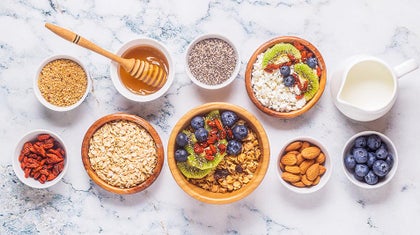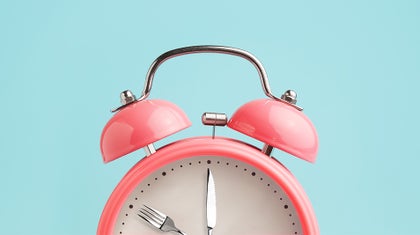Blog
Stay up to date
Nourish
Nourish
2 min read
Understanding nutrient density (and why it matters)
Nourish
3 min read
Food mind games: how stress affects your appetite
Nourish
3 min read
The pre-game plate: how to eat like an athlete before a fitness event
Nourish
3 min read
5 high protein snack ideas that actually deliver
Nourish
3 min read
For wellness that lasts, ditch the trends and guilt
Nourish
3 min read
Fuel your workout: what to eat before you exercise
Nourish
3 min read
Stop overcomplicating your diet
Nourish
3 min read
Is the mediterranean diet the healthiest in the world?
Nourish
4 min read
7 healthy shots you need to try
Nourish
3 min read
4 quick, nourishing breakfasts for busy professionals
Nourish
3 min read
How to make meal prep easy
Nourish
3 min read
The best summer smoothie recipes
Nourish
3 min read
5 common food myths busted
Nourish
3 min read
Affordable healthy meal plans
Nourish
4 min read
3 superfood salads perfect for spring
Nourish
4 min read
5 healthy veggies you might not know about
Nourish
3 min read
5 ways to support a healthy microbiome
Nourish
3 min read
You can’t exercise your way out of an unhealthy diet
Nourish
4 min read
10 ways to make clean eating easy
Nourish
3 min read
Healthy lunch prep hacks
Nourish
4 min read
Plant-based foods packed with protein
Nourish
6 min read
Crack into these easy egg recipes to increase protein intake
Nourish
4 min read
Carbs are not the enemy – here’s why
Nourish
4 min read
Full and fuelled - navigating a calorie deficit
Nourish
4 min read
Enjoy the silly season while staying on track
Nourish
4 min read
The link between nutrition and recovery
Nourish
5 min read
5 mind-blowing nourish bowl recipes
Nourish
3 min read
5 healthy foods that will lift your mood
Nourish
3 min read
5 healthy, guilt-free snack recipes
Nourish
3 min read
Kitchen tips to bring out your inner-chef
Nourish
3 min read
How to make sure you’re drinking enough water
Nourish
3 min read
What to eat during each stage of your menstrual cycle
Nourish
3 min read
Never eat bland food again – just add spice!
Nourish
3 min read
5 high-protein breakfasts to kick-start your day
Nourish
5 min read
Is intermittent fasting just another fad?
Nourish
4 min read
Choose seasonal fruit this summer
Nourish
3 min read
Cheering for chia seeds
Nourish
3 min read
7 healthy fats you should eat more of
Nourish
4 min read
I’m always hungry before bed, what should I do?
Nourish
3 min read
What is matcha and how should you use it?
Nourish
3 min read
10 healthy road trip snacks
Nourish
5 min read
Baked salmon in Vietnamese rice paper rolls
Nourish
3 min read
Calorie conscious meals without the prep
Nourish
3 min read
Soy & sesame soba noodles
Nourish
5 min read
Choose the right protein powder
Nourish
5 min read
V-Cafe’s 3 most popular smoothies
Nourish
5 min read
Have I hit a weight loss plateau?
Nourish
4 min read
Grow your own indoor edible garden
Nourish
4 min read
8 tips for a healthier Easter
Nourish
5 min read
3 ways to adjust calorie dense meals
Enjoying our blog?
Sign up to our newsletter to get updates on training, healthy living, news and events.

















































